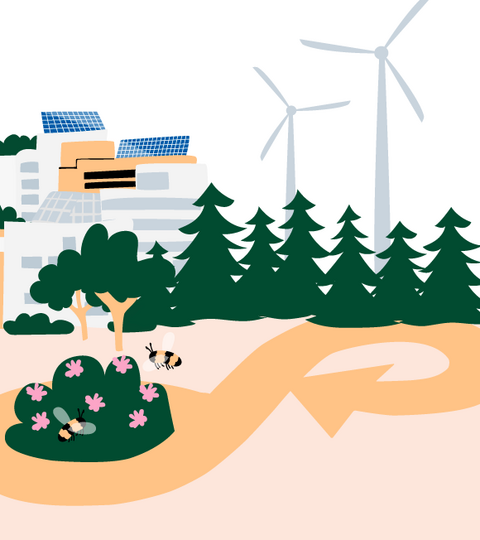Energy transition to create opportunities for new roles for residents and the forming of energy communities
The role of energy in society is so significant that the energy transition affects us all. The energy transition refers to a transition from fossil fuel-based production towards carbon-neutral energy sources. We examined the changes brought about by the energy transition for residents and companies in Espoo and the City itself.
Energy plays an increasingly visible role in residents' daily lives
A survey commissioned by the City identified opportunities for renewable energy, energy citizenship and energy communities in Espoo. According to the energy survey, both residents and businesses as well as other organisations need advice, support and information on the development and deployment of low-emission energy solutions. Meetings between a party starting an energy project and an expert are considered important. The presentation material on the survey can be found at the end of this article as an attachment (in Finnish, not accessible).
A resident survey conducted in June highlighted the need for information on energy saving methods, solar power, and pricing and maintenance agreements for different energy systems. The residents’ role as energy citizens has become more prominent and, as a result, energy has become more visible in everyday life. Building owners have become electricity producers, and charging points for vehicles have moved from filling stations to homes. However, residents' access to the energy system has not been self-evident. The EU directive on common rules for the internal market for electricity (EU 2019/944), which entered into force in 2020, requires Member States to guarantee citizens the possibility to establish energy communities. An energy community is a consortium of different actors that utilises energy production, procurement and other energy services between the members of the community.
For the survey, we interviewed companies with experience and views on the development of renewable energy solutions operating in the Espoo region. Based on the interviews, companies need guidance and information from the City through planning regulations and plot conveyance terms. Plot conveyance terms, for example, could include a requirement concerning the production of renewable energy in the property and information on what other solutions beyond the required level can be implemented in the building. The City must employ continuous internal coordination to ensure that private companies and other organisations have a clear understanding of development work. The permit and advice processes of cities must be harmonised.
City to play a key role in steering the energy transition
The objectives of the City of Espoo are guided by strategies and objectives at EU and national level. The City's strategy and programmes contribute to the ambition to change. According to the survey, the City should assume a role in which it, does things such as promoting its own investments in low-emission energy systems;
ensuring that the entire lifecycle of its own energy solutions is low in carbon though information steering, normative steering and incentives; as well as encouraging residents to become energy citizens through being active in residents’ associations, for example.
In order to promote renewable energy, energy citizenship and energy communities, we will cooperate extensively across sectors in Espoo. We need to bring together different actors, such as technology suppliers, residents, construction companies, civil servants and researchers, in order to achieve the best solutions on the whole. Join us in making energy transition a reality in Espoo. Sign your organisation up for joint development(external link, opens in a new window).
The survey is a part of the Solution Path to Sustainable Growth Ecosystems (RAKKE) project, funded through the support for sustainable growth and vitality in Uusimaa (UKKE) funding.
Downloadable files
- 2022_09_28_Espoon energiaselvitys.pdfFile is only available in Finnish
